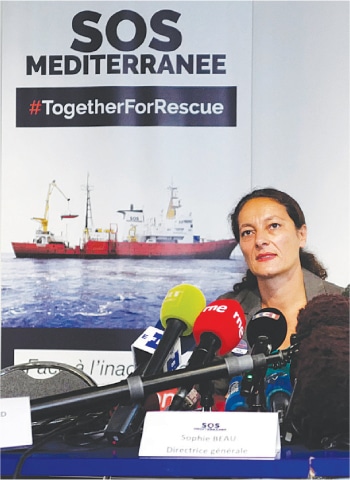VALLETTA: Malta said on Tuesday it would allow the Mediterranean rescue ship Aquarius, which has been barred for four days from several coastal states, to dock after five European Union countries agreed to take in 141 migrants on board.
The boat, run by the Franco-German charity SOS Mediterranee and Doctors without Borders (MSF), had been at the centre of the latest continent-wide tug-of-war over how to cope with the arrival of seaborne migrants.
The migrants, rescued off the coast of Libya, will be distributed among France, Germany, Luxembourg, Portugal and Spain, the Maltese and French governments said.
Sixty of 114 migrants who had been brought to Malta separately on Monday will go to other EU member states.
The charities gave a cautious welcome to the deal, saying EU states now needed to agree on a more permanent mechanism that would avoid seeing rescue ships stranded at sea for days.
“Maybe European states have finally understood that this concerns our common border at the south of Europe, that this is a problem for the 28 member states, and that we can’t avoid responsibility and should work together,” Frederic Penard, director of operations at SOS Mediterranee, told a news conference.
Spain will take 60 of the migrants, Spanish Prime Minister Pedro Sanchez tweeted. Portugal said it would take 30 from the Aquarius and other boats that had arrived in Malta. France said it would take in 60.

“The decision was made in a context of humanitarian emergency and highlights the importance of having a lasting and sustainable mechanism to avoid the repetition of crises,” French President Emmanuel Macron’s office said in a statement.
The latest migrants had been rescued from boats off Libya, and Malta had initially argued they should be taken to Libya, Tunisia or the Italian island of Lampedusa, all closer to the rescue points.
It said it changed its mind following discussions with France and other European Union member states, that ended up with a deal on sharing responsibility for the rescued migrants.
Protracted feuds between EU states over how to handle immigrants have thrown the issue back onto the European agenda, despite the fact that overall Mediterranean arrivals have dropped sharply since peaking at around one million in 2015.
The latest row over the Aquarius illustrated how difficult that issue remained despite a deal on migration that EU leaders agreed on at a summit in June.
EU border agency Frontex said on Monday it had counted 73,500 “irregular border crossings” into the bloc so far this year via the sea and the Western Balkans route, more than 40 per cent fewer than in the first seven months of 2017.
Spain took in 629 mainly sub-Saharan Africans from the same rescue boat in June, and Sanchez said this had helped pave the way to Tuesday’s deal, which Malta called “a concrete example of European leadership and solidarity”.
Published in Dawn, August 15th, 2018















































Dear visitor, the comments section is undergoing an overhaul and will return soon.